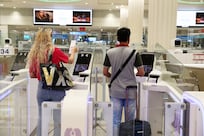Live updates: Follow the latest on Israel-Gaza
Authorities in Sweden were bracing for pro-Palestine protests over Israel's participation in the Eurovision Song Contest, which began in the city of Malmo on Tuesday.
Israel's entrant, Eden Golan, is competing with the song Hurricane, which initially went under the name October Rain. The artist was forced to tweak the original version, which appeared to contain references to the deadly attacks cled by Hamas on October 7 in the south of Israel.
The fallout continued on Tuesday night, when Swedish singer Eric Saade wore a keffiyeh, commonly used by people who want to show support for Palestine, prompting a statement from the European Broadcasting Union to say it regretted the politicisation of the event.
The broadcasting union also told Ireland's first Eurovision Song Contest finalist since 2018 to change their face-paint message, which translated to the word ceasefire, in a nod to the situation in the Gaza Strip.
“The writing seen on Bambie Thug’s body during dress rehearsals contravened contest rules that are designed to protect the non-political nature of the event," a spokeswoman for the EBU said.
“After discussions with the Irish delegation, they agreed to change the text for the live show.”

Swedish armed police patrolled outside the concert venue over fears of unrest due to the European Broadcasting Union's decision not to bar Israel's participation, despite the country's military action in Gaza leading to rising tensions.
Police stepped up security but said no direct threat had been made against the event, which will run until Saturday.
“The threat assessments are primarily for the security service, but we can state that Sweden as a country is on a four on a five-point terror threat level scale,” police spokesman Jimmy Modin said.
“And, of course, we include this in our planning work with the security measures that we’re taking for the Eurovision Song Contest, but it’s important to note that there’s no direct threat to Eurovision.”
A pro-Palestinian march is due to be held on Thursday when Israel competes in the second semi-final.

“The demonstrators are going to march from one square to another square in Malmo,” Mr Modin added. “We anticipate that there’s going to be a lot of people joining this demonstration so there might be disturbance to traffic.”
Denmark and Norway have also sent officers to help police the event.
“We can’t rule out something could happen,” Mr Modin said. “We are very well prepared for this event. I don’t think [people] have to be worried about going to Malmo.”
Artists in Finland have led calls for Israel to be banned and the UK's entrant, Olly Alexander, joined others in signing an open letter accusing Israel of genocide.

Ahead of the contest, Israel's artist said she only wished to unite people.
“I come here to show my voice, to share my love, my gift from God and to hopefully make people feel something and leave a mark in their souls and to unite by music,” she said.
“It's up to the people what to do. They have the right to speak their voice, but I'm focusing on my part, which is giving the best performance, and on the good vibes, the good people.
“It's a super important moment for us, especially this year. I feel honoured to have the opportunity to be the voice of my country.”
The UK's Foreign Office warned that there was a possibility of “an increased number of protests in Malmo during Eurovision week.”
“Where more than one protest happens at the same time, on opposing issues, clashes can occur,” it said. “Protests can block access routes. Avoid demonstrations wherever possible and follow the advice of the local authorities.”
The EBU has issued a statement acknowledging the heightened tensions at this year's event but urged people to support the artists.
“The European Broadcasting Union acknowledges the depth of feeling and the strong opinions that this year’s Eurovision Song Contest – set against the backdrop of a terrible war in the Middle East – has provoked,” it said.
The artists are restricted from making political messages during their performances and could face penalties for doing so.
It will be the 68th version of the world's biggest song contest, which is being held in Sweden following the success of Swedish singer Loreen with the song Tattoo last year.
Sweden has won the song contest seven times.























